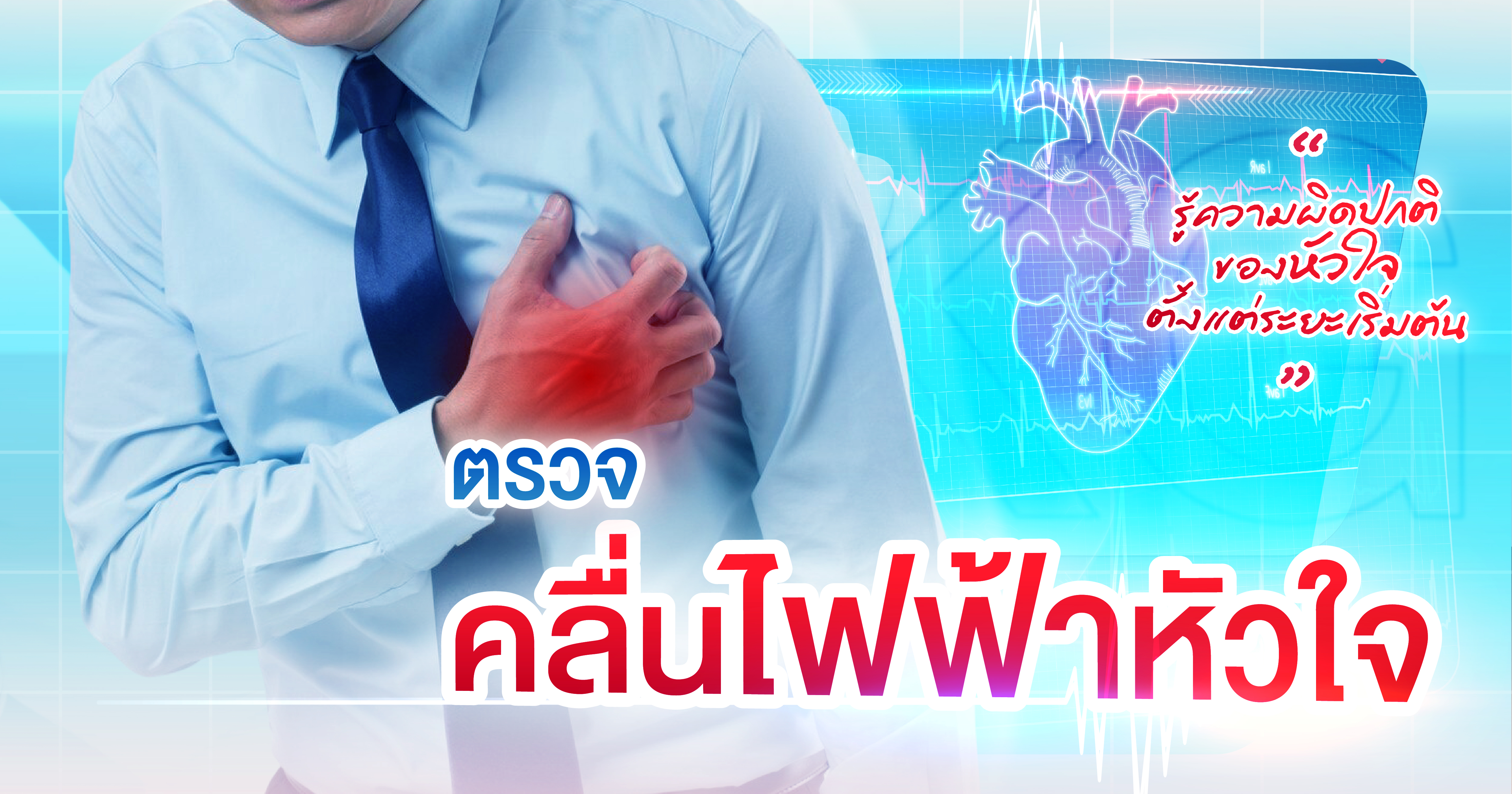 Thonburi Trang
Thonburi Trang

โรคหัวใจเป็นหนึ่งในสาเหตุการเสียชีวิตอันดับต้น ๆ ของคนไทย โดยเฉพาะผู้ที่มีความเสี่ยง เช่น ผู้ที่มีความดันโลหิตสูง เบาหวาน อ้วน สูบบุหรี่ หรือมีคนในครอบครัวเป็นโรคหัวใจ การตรวจ EKG (Electrocardiogram) คือหนึ่งในวิธีการตรวจคัดกรองที่สำคัญ เพื่อวิเคราะห์การทำงานของหัวใจผ่านคลื่นไฟฟ้า ซึ่งช่วยให้แพทย์สามารถตรวจพบความผิดปกติ เช่น หัวใจเต้นผิดจังหวะ กล้ามเนื้อหัวใจขาดเลือด หรือภาวะหัวใจโต ได้ตั้งแต่ระยะเริ่มต้น
ตรวจพบความผิดปกติของหัวใจแม้ยังไม่มีอาการ
ป้องกันโรคหัวใจขาดเลือดเฉียบพลัน
ใช้ในการประเมินสุขภาพหัวใจก่อนผ่าตัดหรือออกกำลังกายหนัก
ใช้ติดตามผลหลังการรักษาโรคหัวใจ
ผู้ที่มีอายุตั้งแต่ 35 ปีขึ้นไป
ผู้ที่มีโรคประจำตัว เช่น เบาหวาน ความดันโลหิตสูง ไขมันในเลือดสูง
ผู้ที่มีอาการใจสั่น เหนื่อยง่าย เจ็บหน้าอก
ผู้ที่มีประวัติคนในครอบครัวเป็นโรคหัวใจ
การตรวจ EKG ใช้เวลาเพียง 5–10 นาที โดยแพทย์จะติดขั้วไฟฟ้าไว้บนหน้าอก แขน และขา เพื่อบันทึกสัญญาณไฟฟ้าจากหัวใจ ผลตรวจจะช่วยให้แพทย์ประเมินสุขภาพหัวใจได้อย่างแม่นยำและรวดเร็ว
ตรวจคลื่นไฟฟ้าหัวใจ (EKG) ได้ที่ ศูนย์ตรวจสุขภาพ โรงพยาบาลธนบุรี ตรัง
สอบถามเพิ่มเติม โทร. 075 215 215 ต่อ 3311
ถาม: ช่วงนี้รู้สึกหัวใจเต้นแรง หรือเต้นไม่สม่ำเสมอบางครั้ง ควรตรวจ EKG ไหมคะ?
ตอบ: แนะนำให้ตรวจค่ะ เพราะการตรวจ EKG จะช่วยดูว่าหัวใจเต้นผิดจังหวะหรือไม่ มีสัญญาณของภาวะกล้ามเนื้อหัวใจอ่อนแรงหรือไม่ ยิ่งตรวจพบเร็ว ก็ยิ่งรักษาได้ทันเวลา
ถาม: ไม่มีอาการเจ็บหน้าอก แต่รู้สึกเหนื่อยง่าย และน้ำหนักเกิน จำเป็นต้องตรวจไหมคะ?
ตอบ: จำเป็นค่ะ เพราะโรคหัวใจระยะแรก ๆ มักไม่แสดงอาการเจ็บหน้าอกชัดเจน บางคนแค่เหนื่อยง่ายหรืออ่อนเพลียก็เป็นสัญญาณได้แล้ว การตรวจ EKG จะช่วยให้แพทย์เห็นภาพรวมการทำงานของหัวใจได้ชัดเจนขึ้น
ถาม: อายุแค่ 30 กว่า ๆ ยังไม่แก่ ต้องตรวจไหม?
ตอบ: จริง ๆ แล้วไม่จำเป็นต้องรอให้มีอายุมากค่ะ ปัจจุบันโรคหัวใจพบในคนอายุน้อยขึ้นเรื่อย ๆ เพราะความเครียด การนอนน้อย และพฤติกรรมการกิน ถ้ามีปัจจัยเสี่ยง เช่น ความดัน เบาหวาน สูบบุหรี่ ควรตรวจไว้ก่อนดีที่สุด
ถาม: ตรวจ EKG ใช้เวลานานไหมคะ เจ็บหรือเปล่า?
ตอบ: ไม่เจ็บเลยค่ะ ใช้เวลาประมาณ 5–10 นาทีเท่านั้น แค่ติดแผ่นขั้วไฟฟ้าขนาดเล็กที่หน้าอก แขน และขา เพื่ออ่านสัญญาณไฟฟ้าจากหัวใจ ระหว่างตรวจไม่ต้องทำอะไรเลย แค่พักสบาย ๆ บนเตียง
ถาม: ถ้าผล EKG ออกมาผิดปกติ ต้องตกใจไหม?
ตอบ: ไม่ต้องตกใจค่ะ ผลที่เห็นอาจไม่ร้ายแรงเสมอไป แพทย์จะดูรายละเอียดเพิ่มเติมและอาจให้ตรวจซ้ำ หรือส่งตรวจอย่างอื่น เช่น อัลตราซาวด์หัวใจ เพื่อวิเคราะห์สาเหตุที่แน่ชัดอีกครั้ง
ถาม: ถ้าตอนนี้ยังรู้สึกปกติ ควรตรวจไหมคะ?
ตอบ: ควรค่ะ เพราะโรคหัวใจบางอย่างไม่มีอาการเตือน การตรวจ EKG เป็นเหมือนการเช็กสุขภาพหัวใจพื้นฐาน ที่ช่วยให้เรารู้ก่อนและป้องกันได้ก่อนป่วยจริง
ถาม: ควรตรวจบ่อยแค่ไหนถึงจะเหมาะ?
ตอบ: ถ้าอายุเกิน 35 ปี หรือมีโรคประจำตัว เช่น ความดัน เบาหวาน ไขมันในเลือดสูง แนะนำตรวจปีละ 1 ครั้งค่ะ แต่ถ้ามีอาการผิดปกติ แพทย์อาจแนะนำให้ตรวจบ่อยกว่านั้น
ถาม: ต้องนัดล่วงหน้าหรือสามารถ Walk-in ได้เลย?
ตอบ: สามารถ Walk-in ได้เลยค่ะ แต่ถ้าต้องการความสะดวกและไม่ต้องรอคิว แนะนำโทรนัดล่วงหน้าที่ 075 215 215 ต่อ 3311 ที่ศูนย์ตรวจสุขภาพ โรงพยาบาลธนบุรี ตรัง